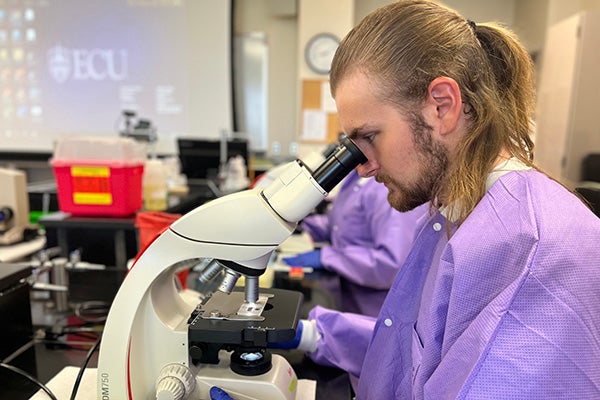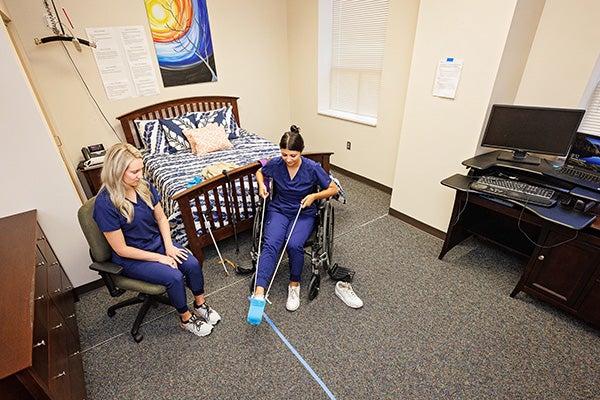ECU allied health programs receive approvals to increase offerings
Two programs within East Carolina University’s College of Allied Health Sciences have received approval to increase their course offerings, including expansion of ECU’s bachelor’s degree in clinical laboratory sciences and its doctoral degree in occupational therapy.
Expanded online CLS offerings
ECU’s clinical laboratory science program — one of only four in the state — has gained approval from the UNC System to enroll students who currently have a two-year degree in medical laboratory technology in an online, four-year CLS degree program. The goal of the program is to increase the number of professionals who can work in, and manage, complex labs that have experienced a 10 percent worker shortage in recent years.

An East Carolina University clinical laboratory sciences student examines specimens under a microscope. ECU’s clinical laboratory science and occupational therapy programs received final approval to increase their course offerings. (ECU file photo)
“Shortages are really acute in terms of laboratory personnel right now, but it’s invisible. If you don’t have a nurse, you don’t have a bed in the hospital. If you don’t have a medical laboratory scientist in the lab, that just slows everything down,” program chair Guyla Evans said.
Lab scientists are often out-of-sight, out-of-mind as they generally don’t have direct patient contact, but Evans stressed that modern medical care relies heavily on the exactness, and speed, of lab testing.
“A significant proportion of medical decision making happens as a result of lab tests,” she said. “People think that those numbers come down magically from the sky and they don’t realize that you need a person with an education to get the right answers.”
There are only 10 states, and Puerto Rico, that license laboratory professionals, complicating the way that education programs are structured and the expectations for graduating students.
The new program will see associate degree holders who currently work in a medical laboratory completing coursework in advanced science areas as well as areas of professional practice, including management of laboratory staff. Because clinical placement is such a challenge for all professional medical programs, Evans envisions an opportunity for students to test out of the need for clinical rotations, as the students would likely have the on-the-job experience necessary to obviate hands-on training that traditional CLS students require.
Of the four institutions in North Carolina that graduate CLS students, only Winston-Salem State University has an online delivery program, so modeling for the ECU program has been a challenge. Evans said that she would love to have the program grow to the point of needing to add faculty, but the expansion to an online delivery mode for the new program may take a year or two to flesh out, mainly because of the lack of precedent that could be used as a model.
There are seven students in the current cohort, though the program is structured to accept 16 students for the fall 2023 cohort. Evans has already received nearly double that in applications.
Graduates of the CLS program are experts in the management of medical laboratories, performance of diagnostic testing, and quality control of instrumentation and lab procedures. Program alumni are also trained in management of laboratory personnel. In the past three years, all graduates of the program have been hired immediately after completing certification exams, which is important for the future of the laboratory science profession and healthcare as a whole.
“About 10 to 15 percent of laboratorians are my age and expecting to retire over the next few years; a lot of the supervisors are in that group,” Evans said, stressing the importance of training the next generation of lab workers to keep pace with the demands of the medical industry. “We did the math and estimate there are about 400 vacant positions a year, state-wide, and all of the schools put together — two-year and four-year — are only graduating about 100.”
OT accreditation
In a major step in the advancement of ECU’s occupational therapy program, the Accreditation Council for Occupational Therapy Education has given candidacy status to the College of Allied Health Sciences to begin admission of doctoral students.
“This approval allows us to admit students into the OTD program according to our approved timeline and then proceed to the pre-accreditation status within the accreditation process,” said Denise Donica, chair of the occupational therapy department.

Occupational therapy student practice activates of daily life skills. (ECU photo by Cliff Hollis)
Students who will be eligible for consideration for the OTD program will be admitted in a cohort of 26 master’s level students beginning in Fall 2023. The majority of that cohort has already been accepted and will arrive in August to start their six-semester coursework.
In spring 2024, enrolled master’s students will be able to apply for the OTD program and up to eight will be accepted and admitted to begin a differentiated learning track in fall 2024.
While both the master’s and OTD students will complete six similar semesters of coursework, including two semesters of clinical experiences working under the tutelage of a licensed occupational therapist, the OTD students will be required to take two semesters of extra course work. They will also complete a 14-week capstone experience and project which may include teaching, research or program development in keeping with ECU’s mission of service to eastern North Carolina and the state.
“We envision that a lot of the capstone experiences will serve the public. We already do that through our curriculum, but this will be a focused project or research project with outcomes that will affect the public,” Donica said.
Once OTD candidates complete the college’s three-year program, they must sit for the national certification examination which will qualify them as an occupational therapist, registered, the same as the master’s program graduates.
“Our design is unique. There are programs nationally that are just a master’s; there are programs that are just a doctorate. We decided to offer both in order to best meet the needs for our students,” Donica said. “You get the same license to practice no matter which degree you earn. If your intention is to focus on clinical practice, the master’s degree is the most efficient route. However, if you want an experience that includes more training in leadership and a focused experience in an area of interest, then the OTD may be your pathway. We have a unique program where students don’t have to decide before they apply.”
ECU’s OTD program will be the only one offered by a public university in North Carolina, Donica said. As public-school students, ECU OTD graduates should expect to pay considerably less for their education than their peers at private institutions.
As graduates of the OTD program, alumni will be able to teach at the master’s and doctoral level, which is important for the continuing growth of doctoral education in the occupational therapy program. In order to retain the doctoral occupational therapy accreditation, OTD faculty must have a doctoral education and at least 50 percent of those faculty must have a post-professional degree – such as a Ph.D. or Doctor of Education credentialing.